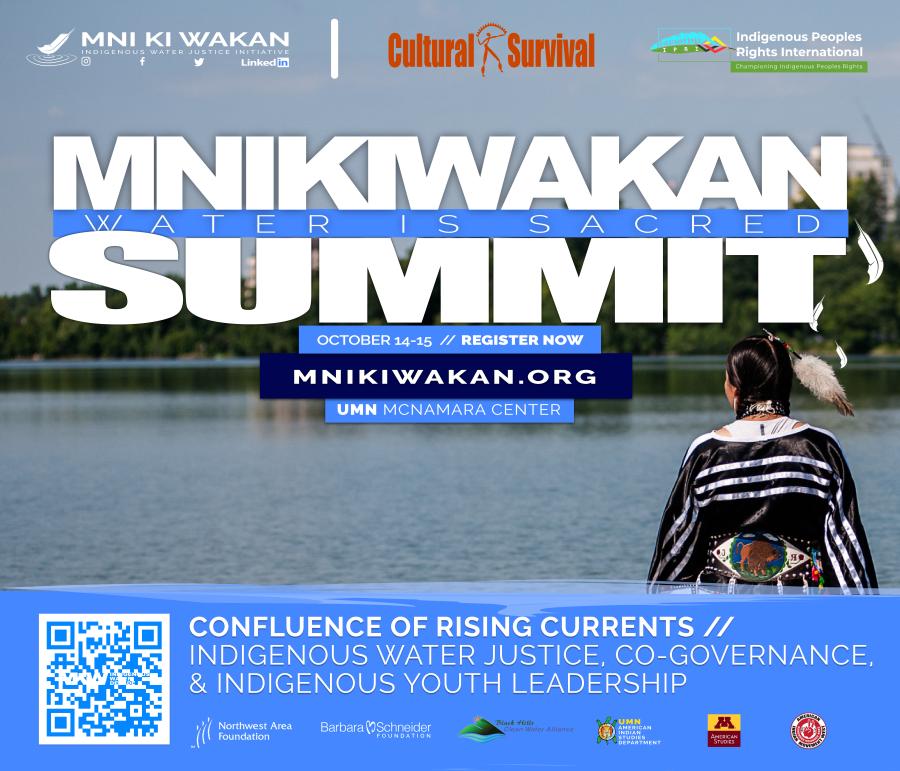At the White House Tribal Nations Conference December 15, U.S. President Barack Obama announced that the United States would "lend its support" to the UN Declaration on the Rights of Indigenous Peoples. "The aspirations it affirms," he said, "including the respect for the institutions and rich cultures of Native peoples, are one we must always seek to fulfill. . . I want to be clear: what matters far more than words, what matters far more than any resolution or declaration, are actions to match those words. And that’s what this conference is about. . . That’s the standard I expect my administration to be held to."
The statement is significant because the United States was one of only four countries that voted against the declaration when the UN General Assembly adopted it in 2007, and the last of those four to have reversed its former opposition.
Cultural Survival program officer Jennifer Weston was on hand for Obama's announcement as a member of the press, and she reports that the mood was jubilant. President Fawn Sharp of the Quinault Nation, who introduced President Obama to open the summit, reflected later, "It's exciting and a long time coming, but I especially appreciate his comments that it's actions not words that matter, and I believe he's very committed to not only being a signatory but to implementing both the spirit and intent of the declaration."
Jefferson Keel, president of the National Congress of American Indians, said, "It's amazing that the United States is finally getting on board with the declaration. The U.S. has avoided it for so long, but finally we're seeing some results. It's just another example of what the Obama administration has done for Indian Country, and of how seriously they take the rights of the world's Indigenous Peoples."
The president's decision is the result of a comprehensive review of the declaration by the Obama administration, who held extensive consultations with tribal governments and received over 3,000 written comments. Cultural Survival this summer mounted a campaign to provide every tribal president and chairperson in the U.S. with a copy of the declaration, a sample letter to submit to President Obama, and background information and perspective on the declaration. Volunteers and staff then logged hundreds of follow-up calls to tribal government offices urging submission of letters detailing how the declaration reinforces the exercise of local tribal rights. Many tribes sent letters, and their pressure played a role in changing the U.S. position. Many of the largest national intertribal organizations in the U.S., including the National Congress of American Indians and the United Southern and Eastern Tribes, also passed resolutions calling for endorsement and implementation of the declaration.
At the close of the Tribal Nations Conference the White House issued their official statement on supporting the declaration, which was generally positive, highlighting the administration's many efforts on behalf of Native Peoples. It was, in fact, far more wholehearted in its endorsement than those of Canada or New Zealand, two of the other countries that innitially voted against the declaration. There was, however, one disappointing aspect of the statment.
Perhaps the most important provision in the declaration is the requirement that governments get Indigenous Peoples “free, prior, and informed consent” before embarking on any development project or other action that would affect the Indigenous People’s territory. The White House statement says that, “the United States understands [the importance of a] call for a process of meaningful consultation with tribal leaders, but not necessarily the agreement of those leaders, before the actions addressed in those consultations are taken.”
On balance, however, the endorsement is very good news and provides a solid foundation for future progress. “The U.S. endorsement of the declaration symbolizes a significant step towards collective international recognition of the rights of Indigenous Peoples and their assertive status as peoples,” said Suzanne Benally, Cultural Survival’s new executive director. “While we applaud the endorsement, the position taken by the U.S. should extend beyond the limitations of its historical policies and practices to those that embody and guarantee full recognition of sovereignty in its deepest cultural, spiritual, and political significance.”
Les Malezer, an indigenous Australian and Cultural Survival board member, who was instrumental in getting the declaration adopted by the UN General Assembly, also applauded the decision: “Obama is the most powerful of the few world leaders who choose to publicly advocate human rights for Indigenous Peoples. The president must be congratulated for emphasizing the pragmatic nature of the declaration and for not qualifying the rights in the declaration, as some critics feared. Hearing the U.S. President back these sentiments is a landmark for the declaration and gives encouragement to Indigenous Peoples everywhere that states can move forward to embrace the rights of Indigenous Peoples. It shows that the declaration is growing stronger and more prominent as an international benchmark."



